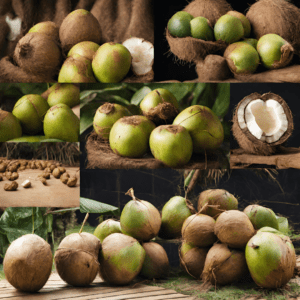The Eco-Friendly Guide: Unveiling the Sustainable Practices in Coconut Farming

Coconut farming has been a significant part of agriculture in many tropical regions for centuries. Its versatile uses, not only as a food source but also for various byproducts, have made it a highly valuable commodity in the global market. However, in recent years, there has been an increased awareness about the environmental impact of certain farming practices associated with coconut cultivation. This article aims to shed light on the sustainable practices in coconut farming that promote eco-friendliness and help preserve our planet.
Sustainable Coconut Cultivation Methods
Organic Farming Practices
Opting for organic farming methods is an essential step towards sustainable coconut farming. These methods eliminate the use of synthetic fertilizers, pesticides, and genetically modified organisms, reducing potential harm to soil, water sources, and biodiversity. Organic coconut farming fosters a natural balance, allowing the ecosystem to thrive without compromising quality or yield.
Efficient Water Management
Water scarcity is a pressing issue affecting agriculture worldwide. In coconut farming, efficient water management practices can significantly reduce water consumption and minimize wastage. Strategies such as drip irrigation, mulching, and rainwater harvesting can be employed to optimize water usage. These methods not only conserve water but also enhance soil health and prevent erosion.
Soil Conservation Techniques
Soil erosion is a common problem in coconut plantations due to heavy rainfall and steep slopes. Implementing soil conservation techniques is crucial to prevent soil degradation and maintain the fertility of the land. Terracing, contour plowing, and planting cover crops are effective methods in reducing soil erosion and creating a more sustainable farming environment.
Integrated Pest Management (IPM)
Coconut trees are susceptible to various pests and diseases that can negatively impact the overall yield. Integrated Pest Management (IPM) is a holistic and eco-friendly approach that prioritizes the use of natural pest control methods. By employing biological controls, crop rotation, and proper monitoring techniques, coconut farmers can significantly reduce the use of chemical pesticides while promoting ecological balance.
Recycling and Utilizing Coconut Byproducts
One of the key advantages of coconut farming is the abundance of byproducts that can be recycled and used in various applications. This not only reduces waste but also provides additional revenue streams for farmers. Here are a few notable coconut byproducts and their sustainable uses:
-
Coconut Husks: Coconut husks can be used to produce coir, a versatile material used for making ropes, mats, and soil erosion control products. Incorporating coir-based products aids in reducing the use of synthetic materials and promotes a more sustainable approach in agriculture.
-
Coconut Shells: Coconut shells can be repurposed to create charcoal, which has multiple applications, including fuel, water filtration, and soil amendment. Utilizing coconut shells as an alternative to traditional charcoal production helps in the preservation of forests and reduces carbon emissions.
-
Coconut Water: Coconut water is not only a refreshing beverage but also a rich source of nutrients and electrolytes. With the rise in demand for healthy beverage options, packaging and promoting coconut water in an eco-friendly manner can contribute to reducing single-use plastic bottle waste.
-
Coconut Oil: Coconut oil is widely used in culinary, cosmetic, and medicinal applications. Choosing sustainably sourced coconut oil supports responsible farming practices and encourages fair trade, benefiting both the environment and local communities.
Promoting Fair Trade and Ethical Practices
Sustainable coconut farming goes beyond environmental aspects; it extends to the socio-economic impact of the industry. Supporting fair trade ensures that farmers receive fair prices for their produce, enabling them to invest in sustainable practices and improve their livelihoods. By prioritizing ethically sourced coconuts, consumers play a vital role in encouraging sustainable farming practices and driving positive change.
Conclusion
The sustainability of coconut farming lies in the adoption of eco-friendly practices that prioritize environmental conservation and social responsibility. From organic farming and efficient water management to recycling byproducts and promoting fair trade, every step towards sustainability contributes to a greener future. As consumers, we have the power to make a difference by choosing products derived from sustainable coconut farming practices. Let’s embrace the eco-friendly path and support a more sustainable coconut industry.
External Links:
– Organic Farming Techniques
– Integrated Pest Management
Internal Links:
– thangammanexports.com
– Mature Coconut and Coconut Byproducts
– Exporting Coconuts from India



